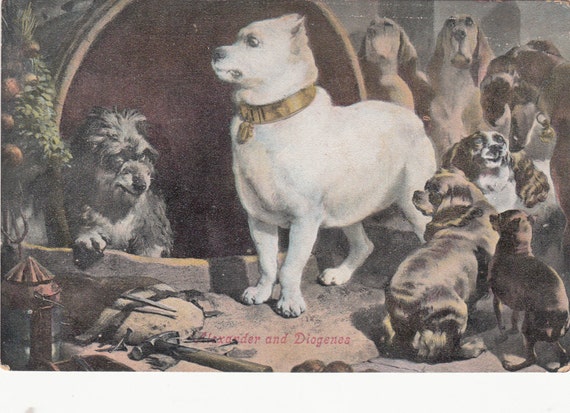

When Lysias the druggist asked him if he believed in the gods," How can I help believing in them," said he, "when I see a god-forsaken wretch like you?" One day Diogenes shouted out for men, and when people collected, hit out at them with his stick, saying, "It was men I called for, not scoundrels."ĭiogenes was particularly upset by extravagant and lavish interior decorations, and at one rich man's house, on finding himself surrounded by expensive carpets and sumptuous cushions, Diogenes spat in the owner's face, and then wiped it with his rough cloak and apologized, saying it was the only dirty place in the room he could find to spit.Īfter being banished from Sinope, Diogenes said, "The Sinopeans have condemned me to banishment I condemn them to stay at home!" When Diogenes noticed a prostitute's son throwing rocks at crowd, Diogenes said to him "Careful, son. Once, when watching an incompetent bowman at an archery contest, Diogenes walked over and sat down right next to the target, explaining that it was the only place where he felt safe. Here they are: Favorite Remarks of the Cynic: Naturally, all the stories of Diogenes seem to have the same sort of cynical comedy to them as his first encounter with Antisthenes.

I nuzzle the kind, bark at the greedy and bite scoundrels." His attitude was grounded in his great disdain for what he perceived as the folly, vanity, pretence, self-deception, social climbing, and artificiality of much human conduct. Unlike the other citizens of Athens, Diogenes avoided earthly pleasures. Antisthenes struck Diogenes with his staff when Diogenes first came to the doors of the cynic school, but Diogenes refused to leave and said "Strike me, Antisthenes, but you will never find a stick sufficiently hard to remove me from your presence, while you speak anything worth hearing." Then, Diogenes became a student of Antisthenes.ĭiogenes became the pupil of Antisthenes and rapidly surpassed his master both in reputation and in the austerity of his life.

Attracted by the ascetic teaching of Antisthenes, Diogenes came to be his student. The story of how Diogenes and Antisthenes came together is an interesting one. Now you know the etymology of the word cynic. In fact, Diogenes teacher Antisthenes - pupil of Socrates - founded the Greek school of cynicism, and Diogenes was and is the most notorious cynic. Most often the Greeks called Diogenes "the dog". Plato called Diogenes "a Socrates gone mad". The people of ancient Greece knew the philosopher Diogenes by many nick names. For all we do here at this site to combat hunger and poverty and raise awareness of the present-day hunger and poverty epidemics, this site wouldn't be complete without a page dedicated to my number one hero Diogenes (412 BC - 323 BC), the wise social critic who gave up possessions and chose to live in poverty.


 0 kommentar(er)
0 kommentar(er)
